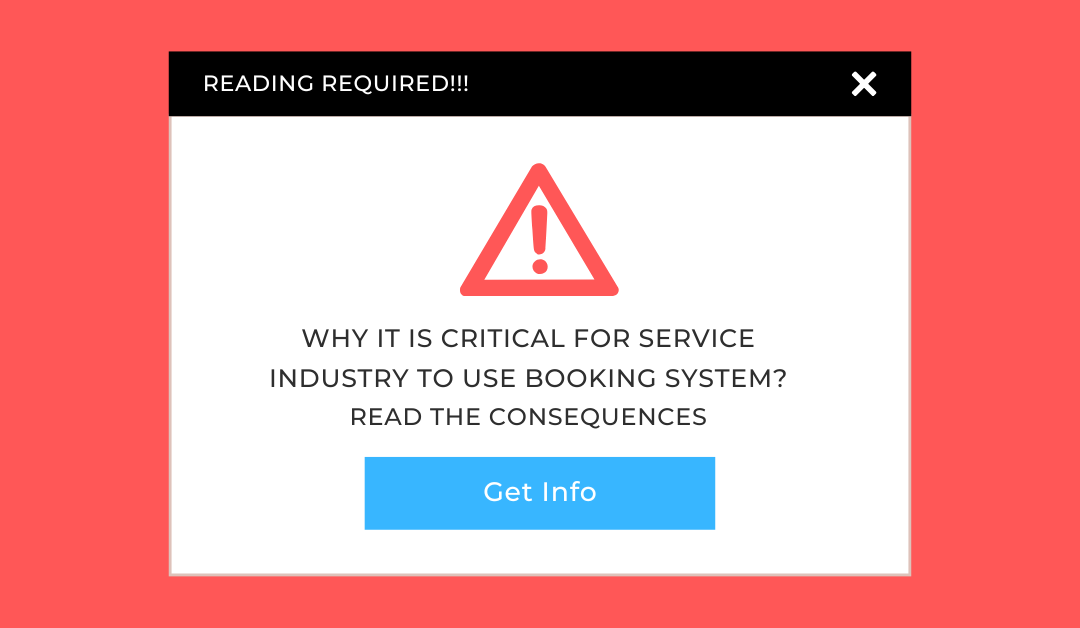For service companies, effective appointment booking is crucial to the success of the business. But without the right tools and processes in place, managing appointments can quickly become a time-consuming and error-prone task.
That’s why many service companies are turning to cloud appointment booking systems to streamline the process and improve customer service.
In this blog post, we’ll explore some of the bad results and impacts that service companies may experience if they don’t use a cloud appointment booking system.
Double Bookings and Scheduling Conflicts
One of the most significant problems that service companies may encounter when they don’t use a cloud appointment booking system is double bookings and scheduling conflicts.
Without a centralized system to manage appointments, it’s easy to accidentally book two clients for the same time slot or forget about overlapping appointments.
This can lead to frustrated customers who are forced to wait longer than they expected or even turned away entirely.
Double bookings can also result in lost revenue for the service company. If a provider is scheduled to see two clients at the same time, they will have to choose one client over the other, potentially resulting in a lost sale.
This can have a ripple effect on the business, as dissatisfied customers are unlikely to return and may even leave negative reviews online.
Missed Opportunities for Upselling
Another problem that service companies may face without a cloud appointment booking system is missed opportunities for upselling.
A cloud-based system can provide valuable data about clients’ preferences and needs, allowing service providers to offer additional services and products that are tailored to their customers’ needs.
Without this information, service providers may not be aware of the potential upsell opportunities that are available to them. This can result in missed revenue and lost opportunities to deepen relationships with customers.
Inefficient Use of Staff Time
When service providers have to spend time manually managing appointments and keeping track of schedules, they’re not able to focus on the core aspects of their job.
A cloud-based system can automate many of these tasks, freeing up staff time to provide better service to customers.
Without a cloud appointment booking system, service providers may spend hours each week scheduling appointments and sending confirmation emails.
This can take away valuable time that could be better spent building relationships with customers, improving their skills, or expanding the business.
Limited Ability to Adapt to Changing Circumstances
When service companies use a manual or outdated appointment booking system, it can be difficult to quickly adapt to changes in the business or the broader market.
For example, if a new service offering is introduced, or if there is a sudden surge in demand for a particular service, the service company may struggle to adjust its scheduling and availability to accommodate these changes.
In contrast, a cloud appointment booking system can be easily updated and modified to meet changing needs.
Service providers can quickly add new services or adjust their schedules to meet increased demand, ensuring that they are always able to provide the highest level of service to their customers.
Increased Risk of No-Shows and Cancellations
Without a cloud appointment booking system, service providers may be at a higher risk of no-shows and cancellations. Clients may forget about their appointments or simply choose not to show up, resulting in lost revenue and wasted time for the service provider.
With a cloud appointment booking system, service providers can send automated reminders to clients before their appointments, reducing the risk of no-shows and cancellations.
They can also easily reschedule appointments or fill canceled time slots, minimizing the impact of last-minute changes on the business.
Poor Customer Experience
Perhaps the most significant impact of not using a cloud appointment booking system is poor customer experience.
Clients expect a seamless, convenient experience when scheduling appointments, and if the process is cumbersome or confusing, they may choose to take their business elsewhere.
A cloud appointment booking system can provide a user-friendly interface that makes it easy for clients to book appointments, reschedule, or cancel.
This can help to build trust and loyalty with clients, as they feel confident that they are working with a service company that values their time and convenience.
In contrast, a manual or outdated appointment booking system can create frustration and confusion for clients.
They may have to wait on hold for long periods of time to schedule an appointment, or receive conflicting information from different staff members about availability. This can create a negative impression of the service company and lead to lost business.
Security Risks
Finally, service companies that do not use a cloud appointment booking system may be at greater risk of security breaches.
Manual systems often involve the use of paper records or spreadsheets that can be easily lost or stolen, putting sensitive client information at risk.
Cloud appointment booking systems, on the other hand, offer robust security features that protect client data.
They use encryption to ensure that client information is transmitted securely, and they are subject to regular security audits to identify and address potential vulnerabilities.
Conclusion
In today’s competitive business environment, service companies must provide high-quality service and convenience to their clients.
Cloud appointment booking systems such as iTasker offer a range of benefits that can help service providers to achieve these goals, from reducing scheduling conflicts and missed opportunities for upselling to improving the customer experience and enhancing data security.
Without a cloud appointment booking system, service companies may experience a range of negative impacts, including lost revenue, reduced efficiency, and poor customer satisfaction.
By investing in a cloud-based solution, service providers can streamline their appointment booking processes and focus on delivering the best possible service to their clients.

